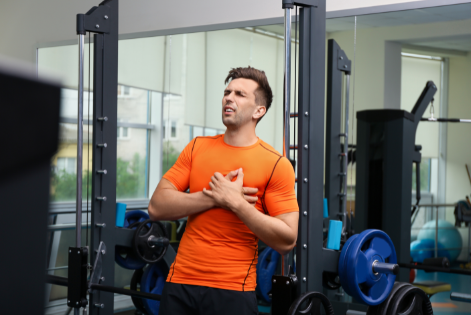Why Are Gym-Goers Experiencing Heart Attacks More Frequently?

In recent years, there has been a surprising and concerning trend: an increasing number of gym-goers—many of whom are young and seemingly healthy—are suffering from sudden heart attacks. While regular exercise is undoubtedly crucial for maintaining heart health, it is important to understand why this paradoxical phenomenon is occurring.
Dr. Vaibhav Mishra, a renowned cardiac surgeon and expert in minimally invasive heart surgery, explains the underlying reasons behind this worrying trend and what fitness enthusiasts can do to protect their hearts.
The Myth: “Fit Means Safe From Heart Disease”
Many believe that being physically fit automatically shields them from heart disease. However, physical fitness does not always equate to cardiovascular health.
Some individuals, despite having strong muscles and low body fat, may still harbor underlying heart conditions or risk factors that remain silent until triggered by intense physical exertion.
Key Point:
Fitness appearance does not always reflect internal heart health.
Major Reasons Behind Heart Attacks Among Gym-Goers
1. Undiagnosed Heart Conditions
Many young adults may have congenital heart defects, electrical abnormalities (like hypertrophic cardiomyopathy), or early-stage coronary artery disease (CAD) without any visible symptoms.
Intense workouts—especially heavy weightlifting or high-intensity interval training (HIIT)—can stress the heart, revealing these hidden problems abruptly.
✅ Tip from Dr. Vaibhav Mishra:
Get a comprehensive heart health evaluation before starting an intense fitness program, especially if there is a family history of heart disease.
2. Excessive Strain from Overtraining
Pushing beyond the body’s safe limits without proper rest can elevate stress hormones like cortisol and adrenaline. These hormones can raise blood pressure, cause inflammation of blood vessels, and even trigger arrhythmias.
-
Overexertion can cause small tears in artery walls, promoting plaque formation.
-
Extreme weightlifting spikes blood pressure dangerously during the lift (“the Valsalva maneuver”).
Result:
A sudden rupture of a small plaque can lead to clot formation and a heart attack.
3. Anabolic Steroid Use
Some gym-goers use anabolic steroids or other performance-enhancing drugs to accelerate muscle growth.
These substances can:
-
Increase “bad” LDL cholesterol
-
Lower “good” HDL cholesterol
-
Promote blood clotting
-
Induce left ventricular hypertrophy (thickening of heart walls)
All of these changes dramatically raise the risk of heart attacks, even in young individuals.
4. Ignoring Warning Signs
Common warning signs of a brewing heart problem—such as chest discomfort, shortness of breath during exercise, dizziness, or unexplained fatigue—are often ignored or attributed to “poor stamina” or “lack of fitness.”
❗ Remember:
The heart often gives early signs. Listening to your body can save your life.
5. Unhealthy Lifestyle Outside the Gym
Some gym-goers believe that working out intensely allows them to indulge in unhealthy habits like:
-
Smoking or vaping
-
Eating high-fat or junk food
-
Excessive alcohol consumption
-
Poor sleep hygiene
Exercise, while powerful, cannot completely undo the damage caused by these risk factors. Heart disease is multifactorial, and lifestyle plays a major role.
Who Is Most at Risk?
According to Dr. Vaibhav Mishra, certain groups are particularly vulnerable:
-
People over 30 who suddenly start heavy workouts without prior fitness.
-
Individuals with a strong family history of heart attacks.
-
Smokers, diabetics, and those with high cholesterol or hypertension.
-
Users of steroids or muscle-enhancing supplements.
How Gym-Goers Can Protect Their Heart Health
✅ Get Regular Check-ups:
Annual physical exams and, if needed, tests like ECGs, echocardiograms, and treadmill stress tests.
✅ Gradually Build Intensity:
Avoid sudden spikes in workout intensity. Progressively train under expert supervision.
✅ Stay Hydrated and Well-Nourished:
Fuel your body properly before and after workouts. Avoid extreme dieting.
✅ Avoid Steroids and Unregulated Supplements:
Consult a certified doctor or dietitian for safe muscle-building strategies.
✅ Know Your Family History:
If there’s a history of cardiac problems, get proactive screenings done.
✅ Listen to Warning Signs:
Don’t ignore chest pain, dizziness, or unusual shortness of breath. Immediate medical attention can prevent disasters.
Final Thoughts
Exercise remains one of the best defenses against heart disease, but it must be done wisely and with awareness. Gym-goers must realize that intense workouts demand a heart that is not only strong but also healthy.
Dr. Vaibhav Mishra emphasizes that a balanced lifestyle, regular heart screenings, and informed fitness practices are the keys to preventing these sudden, tragic heart events.
If you are serious about your fitness journey, make sure your heart is equally prepared to handle the challenge. Your heart deserves as much attention as your muscles.
For expert heart check-ups, preventive cardiology advice, or advanced cardiac care, consult Dr. Vaibhav Mishra today. Your heart health matters!
